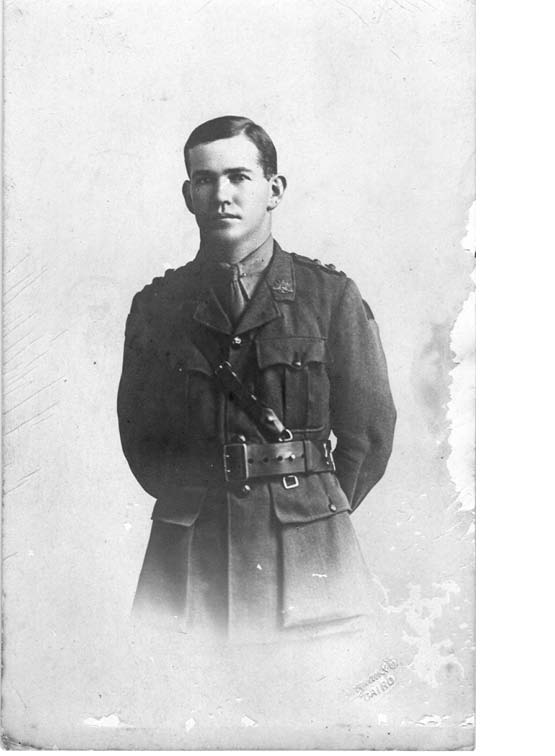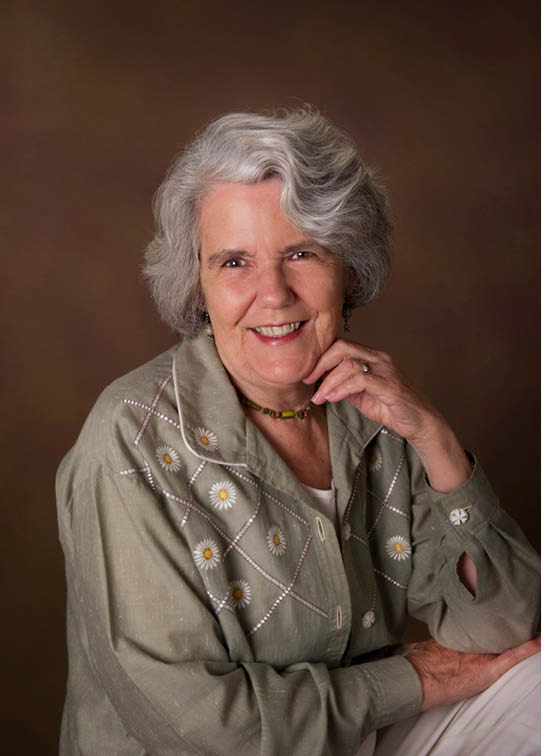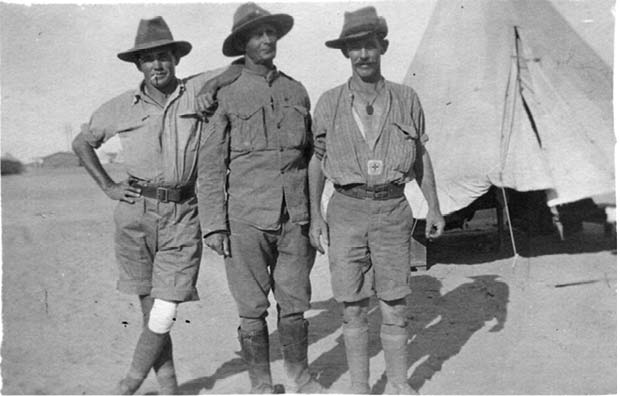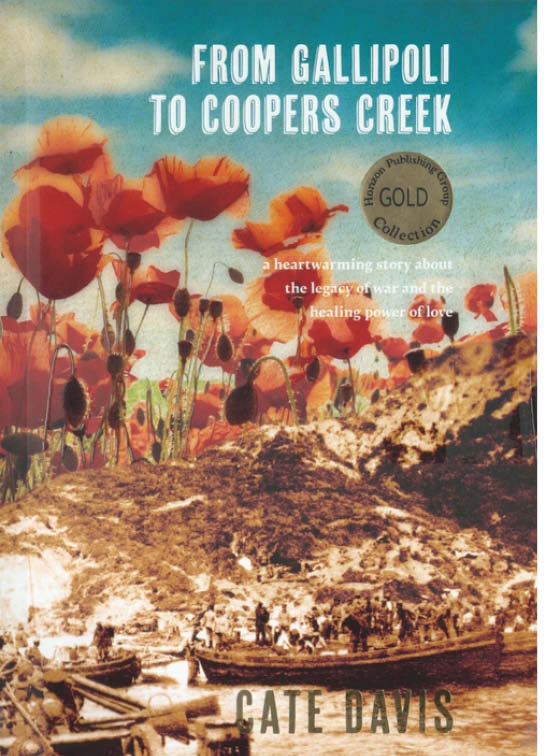For former music teacher turned author, Cate Davis, visiting the battlefields of the First World War was a major moment in her life.
It was a pilgrimage she felt she had to make, not only to research material for a book, but to help lay the ghosts of her late father.

Cate Davis’ father Lieutenant A.B.(Bruce) Campbell who fought and was severely wounded on the battlefields of Gallipoli and Amman.
“I think visiting Gallipoli and later Amman (then part of the Ottoman Empire in Jordan) helped me understand the demons that my father endured when he returned from the war,” Cate, now 80, told Go55s.
Her father, Lieutenant Bruce Campbell, was part of the 6th Light Horse which fought in the Middle East and Turkey throughout the bitter 1914 to 1918 conflicts.
“During our childhood he never talked much about what he had seen or suffered but every Anzac Day when we were growing up just outside Tamworth he’d have a few drinks and we’d get him talking about how much he hated the generals who botched so many attacks,” Cate says.

Author Cate Davis who discovered her late father’s first world war diaries and has turned them into a moving biography.
Lt Campbell, then 24, was the last officer left standing and among the few troops who survived the suicidal assault on Amman as part of the expeditionary forces offensive in March 1918.
He suffered a horrific wound, getting a machine gun bullet in his pelvis which paralysed him and he was left seemingly dead on the battlefield for hours.
In excruciating pain and with no feeling in his legs, he had to be stretchered out from the killing grounds on a camel cacolet, a type of Light Horse ambulance for wounded men who could not be strapped to a horse because of the risk of worsening their suspected spinal injuries.
The irregular gait of the camel over miles of rugged terrain for days on end only increased the agony and Lt Campbell passed in an out of consciousness.
It took another 11 days using every means of land transport available before they were able to get him more dead than alive to a regular hospital in Port Said.

Lt Bruce Campbell (left) with fellow officers in camp
“He remembers a padre saying prayers for the dying where he and some other officers were lying and they even sent a telegram to his mother saying he had died of his wounds,” Cate said.
“The whole affair at Amman was just suicidal, the Anzac troops were being used as cannon fodder by the British. They had to storm a citadel perched on top of a very steep hill where the Turkish troops had been well entrenched and had set up machine gun posts.
“What made it worse for the Anzacs and my father in particular was that the order to attack was made by an Australian.
“They just mowed the Anzacs down, my father was the last of three officers who survived the initial attack and there were very few left of his troops.
“Despite the seriousness of his wounds, he began to get feeling back in his legs and he was soon walking again and doctors decided not to try to remove the bullet from his pelvis. His recovery was miraculous and he returned to the battlefield to take part in the Third and last Battle of Amman at which the only surviving Turkish garrison eventually surrendered,” she said.
Cate and her family knew little of her father’s war experiences until after his death aged 81 in the 1970s when the family discovered the former officer’s war diaries.
She said they were very terse but after reading them many times she was able to piece together some sort of chronology and led her to begin researching her book, From Gallipoli to Coopers Creek, the name of a farming property between Tamworth and Armidale where her father settled after the war.
“It was remarkable how he survived it all…he had been wounded several times at Gallipoli and the bullet which lodged near his spine at Amman stayed with him for the rest of his life,” Cate said.
“But I never saw him limp and he worked hard all his life on the farm and he and my mother were happily married and my sister and brother and I had wonderful childhoods.
“He was quite a strict disciplinarian and wouldn’t let my sister and myself go on to higher education after we finished at school. Eventually, my mother talked him round and I was able to gain three different degrees from various universities and a Masters in education and music.
“But by that time I was almost in my 30s and I had two kids,” Cate laughs.
Although she admits her first love in life was writing, Cate became a long time music teacher in Senior High School in Albury and co-founded the Border Music Camp which is still running after more than 40 years.

It was after she was forced to retire from teaching due to tinnitus that she concentrated on her writing career. She’s published a children’s book Polly Platypus and a biography of an aunt Called Great Granny B.
“About six years ago I decided to go over to Turkey to research the biography of my father and see the battlefields where he had fought and was wounded.
“I felt I owed it to him. In his diaries he talks of the dreaded horrors of war, of seeing thousands of corpses left on the Gallipoli battlefields for months, with the horrid stench and he had vivid memories of the mutilated bodies which stayed with him for the rest of his life.
“I travelled with a company to Amman to see where the ill-fated battle took place and I stood on top of the hill and looked down from the citadel where the Turks were entrenched to where my father would have received his near-fatal wound. It made you wonder how anyone could have got out of that massacre alive.
“I also went to Gallipoli and walked the areas there where the savage fighting had taken place and thanks to a wonderful local guide who couldn’t do enough for me where he heard I was Australian and daughter of an Anzac I was able to locate the grave of a young family cousin who had died fighting alongside my father,” Cate said.
“Throughout his life, I don’t think he ever got over it but he rarely spoke of it and it wasn’t until we unearthed the diaries that we became aware of just what he and his fellow soldiers had to endure.
“It was a great pilgrimage for me, I felt some sort of fulfillment and I think it helped me understand my father much better,” Cate said.
“The most amazing thing was that he was always bitter about the ineptitude of the high ranking command, both British and Australian, but he had a deep respect for the Turkish soldier and would not hear a word of criticism about them.
“I think a lot of that mutual respect still exists today and is highlighted in the memorials erected by the Turks for the Anzac troops which stand to this day,” she said.
****************************************************
- From Gallipoli to Coopers Creek, by Cate Davis, is published by Horizon Publishing Group.
- Cate Davis has written two sequels to her already published work, Polly and her Puggles and In The Shadow of the Wars.
Main Picture Officers of the 6th light horse following the battle of Amman in 1918.





